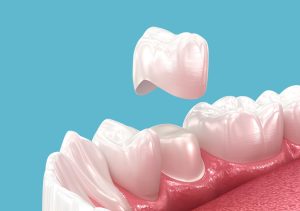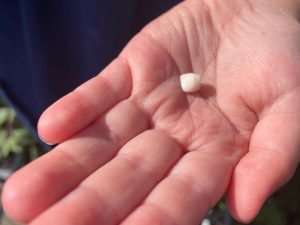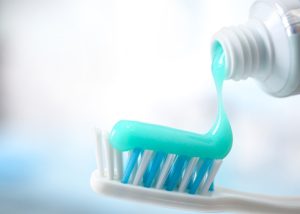What to Do When Your Crown Is Loose: Professional Tips from Dr. Ajmo
Dental crowns are one of the principal dental restoration treatments used today. They take the form of tooth-shaped caps that sit over the top of teeth that are damaged, broken, or severely decayed. Unlike veneers, crowns completely encase the affected tooth inside. Knowing what to do if your dental crown is loose but won’t come off is essential to maintaining good oral health and preventing further complications.
If your dental crown feels loose, don’t wait! At PGA Advanced Dentistry, we provide professional care to restore your smile. Conveniently serving patients from Palm Beach Gardens, North Palm Beach, and Lake Worth. Contact us at (561) 627-8666 to schedule a consultation with our Palm Beach Gardens dentist.
What are Dental Crowns?
Dental crowns are a common dental procedure that can restore the function and appearance of damaged or decayed teeth. They are custom-designed to replicate the size and shape of your other teeth so that they look as natural as possible once in place. However, complications can arise with any dental procedure, and dental crowns may encounter problems.

They can be made in a variety of materials including:
- Metal
- Zirconia
- Porcelain fused to metal (PFM)
- Porcelain fused to zirconia (PFZ)
- 100% ceramic
People who require a crown on a tooth that is situated near the front of the mouth tend to opt for 100% ceramic or porcelain fused to metal crowns. This is because they can be color-matched to the patient’s existing teeth, making them virtually imperceptible.
Our back teeth tend to work a lot harder than our front ones, and so most dentists recommend that metal-based crowns are used for them, as they are stronger and more resilient than all-ceramic varieties.
Why Has My Dental Crown Come Loose?
Despite their widespread use and high success rate, there are occasions when a dental crown may come loose. There are several reasons why a crown may become loose.
The loose crown does not fit properly over the damaged tooth in order to fit a dental crown, the underlying tooth must first be prepared so that the crown fits well over the top. In some cases, this means filing down the damaged or decayed tooth, and in others, filling material may be needed to build the affected tooth up to the correct size.
If the loose crown does not fit properly over the tooth, the cement that is used to secure it in place can wash out from underneath it, causing it to come loose.
- Underlying decay: Dental crowns are prosthetic so they cannot decay but the natural tooth that is encased within your crown can. Decay usually develops along the gum line where the crown and tooth meet. When this happens, the decay can cause the cement to break down and your crown to come loose.
- Deteriorating dental cement: A special cement is used to hold your crown in place, but over time the adhesiveness of the cement can deteriorate, causing the crown to come loose.
- Too many sticky sweets: While the occasional sticky toffee may not do your teeth any harm, people who regularly indulge find that the pull on their crowns each time they eat them can cause them to gradually weaken over time. In many cases, a crown can even come off entirely as a result of becoming stuck to a sticky candy.
Common Problems with Dental Crowns
There are several potential problems that can occur with dental crowns. These include cracks or chips in the crown, a loose or fallen crown, discoloration or staining, and sensitivity or pain in the tooth. These problems can occur for various reasons, including biting down on hard foods, trauma to the mouth, or simply wear and tear over time.
What to Do if Your Dental Crown Encounters a Problem
If you encounter a problem with your loose dental crown, it’s important to contact your dentist immediately. Explain the problem and provide details about any symptoms or discomfort you’re experiencing. Your dentist may ask you to come in for an evaluation, or they may provide instructions for at-home care, such as taking pain medication or applying ice to the affected area.
Temporary Solutions for a Loose Crown
If your dental crown has become loose or fallen out completely, temporary solutions can help until you can see your dentist. Start by carefully cleaning the loose crown and tooth to remove debris or bacteria. Then, apply a dental adhesive or temporary dental cement to reattach the crown. It’s important to avoid eating hard or sticky foods until a dentist can properly reattach the crown and not damage your underlying tooth structure.

Long-Term Solutions for Dental Crown Problems
Depending on the nature and severity of the problem with your dental crown, your dentist may recommend crown repair, replacement, or cosmetic dentistry. They may also evaluate the underlying tooth for damage or decay and discuss necessary treatment options with you.
What Do I Do if My Dental Crown is Loose or Falls Out?
If your crown seems loose or has fallen out, you should make an appointment with your dentist as soon as possible. Losing a crown is usually considered to be a dental emergency, and most dentists will do their best to see you within 48 hours of your call. In many cases, they may be able to refit your crown before the tooth underneath suffers from further damage or decay.
In the meantime, if your crown falls out but you still have it, you should try and pop it back onto the affected tooth using a dab of toothpaste or dental adhesive. This will help protect the tooth structure until you can see your dentist.
If you have lost the loose crown, make sure that you tell our Palm Beach Gardens dentist this when you call. Teeth that have lost their crowns are at a high risk of infection and further decay and may be extremely sensitive or painful. By letting your dentist know that there is no way of covering the affected tooth until you see them, they may be able to schedule your appointment even sooner.
Preventing Future Dental Crown Problems
To prevent future dental crown problems, it’s important to maintain good oral hygiene habits, including brushing twice daily, flossing daily, and using an antibacterial mouthwash. Avoiding hard or sticky foods and wearing a mouthguard if you grind your teeth can also help prevent damage to loose dental crowns. Regular dental check-ups and cleanings are also essential to maintaining the health of dental crowns and overall oral health.
 Practice good oral hygiene. Maintaining good oral hygiene is essential to preventing dental crown problems. Brush your teeth twice daily with fluoride toothpaste, and floss daily to remove any food particles and plaque buildup. Use an antibacterial mouthwash to kill any remaining bacteria and freshen your breath. Good oral hygiene can help prevent decay and gum disease, which can weaken the tooth underneath the crown.
Practice good oral hygiene. Maintaining good oral hygiene is essential to preventing dental crown problems. Brush your teeth twice daily with fluoride toothpaste, and floss daily to remove any food particles and plaque buildup. Use an antibacterial mouthwash to kill any remaining bacteria and freshen your breath. Good oral hygiene can help prevent decay and gum disease, which can weaken the tooth underneath the crown.
- Avoid hard or sticky foods. Avoiding hard or sticky foods can help prevent dental crown problems. Hard foods such as ice, hard candy, and nuts can cause damage to the crown or underlying tooth, while sticky foods such as caramel and taffy can cause the crown to become dislodged. If you eat these foods, try to chew on the opposite side of your mouth to avoid putting pressure on the crown.
- Wear a mouthguard. If you grind your teeth while sleeping or clench your jaw during the day, wearing a mouthguard can help protect your dental crown. Grinding and clenching can put pressure on the new crown and cause it to become loose or dislodged. A mouthguard can help cushion the teeth and protect the crown from damage.
- Get regular dental checkups. Regular dental checkups are important to maintaining the health of your dental crown and surrounding teeth. During a checkup, your dentist can check for any signs of tooth decay, gum disease, or other issues that could affect the crown. Your dentist can also check the crown’s fit and make necessary adjustments to prevent future problems.
- Avoid using your teeth as tools. Using your teeth as tools, such as to open packages or bite your nails, can cause damage to your dental crown. This can cause the crown to become loose or dislodged or even cause damage to the underlying tooth which will need temporary dental cement. Use scissors or other tools to open packages and avoid biting your nails.
Do You Know What to Do if Your Crown is Loose but Won’t Come Off?
Dental crowns are an effective solution for restoring the function and appearance of damaged or decayed teeth. However, problems can arise, and knowing what to do if your dental crown encounters a problem is essential. Following proper oral hygiene habits and seeking prompt treatment from your dentist can help prevent future complications and maintain good oral health.
If you have a dental crown that seems loose, seek professional help immediately to get it secure in back in place and protect yourself from losing it entirely. At PGA Advanced Dentistry in Palm Beach Gardens, we frequently treat failed dental work by replacing loose or broken crowns with higher-quality materials that will last. Whether you’re in Palm Beach Gardens, Jupiter, or West Palm Beach, call us today at (561) 627-8666 to schedule an appointment and protect your smile!
